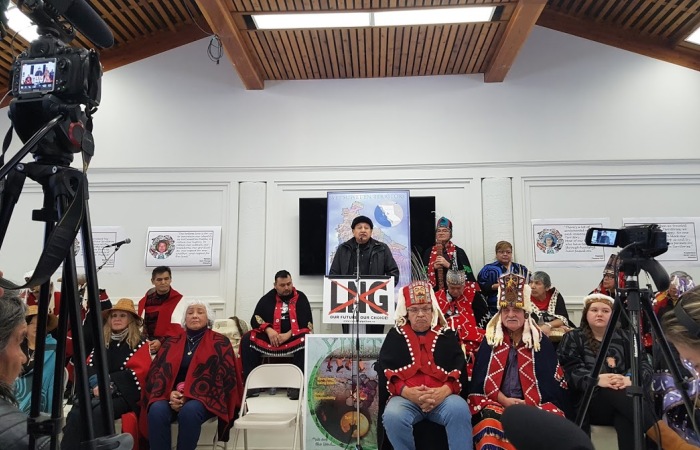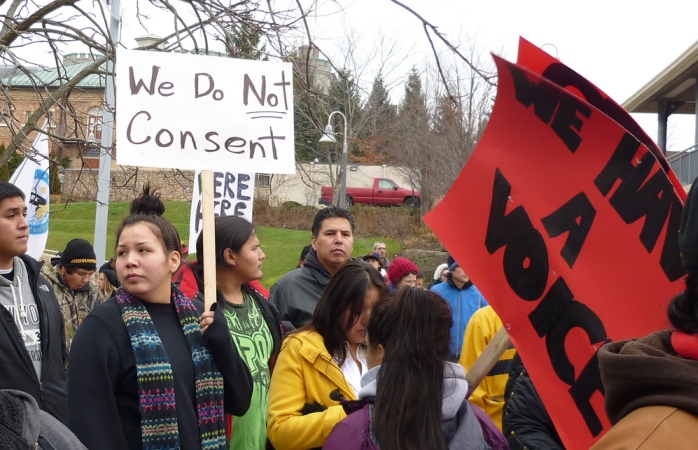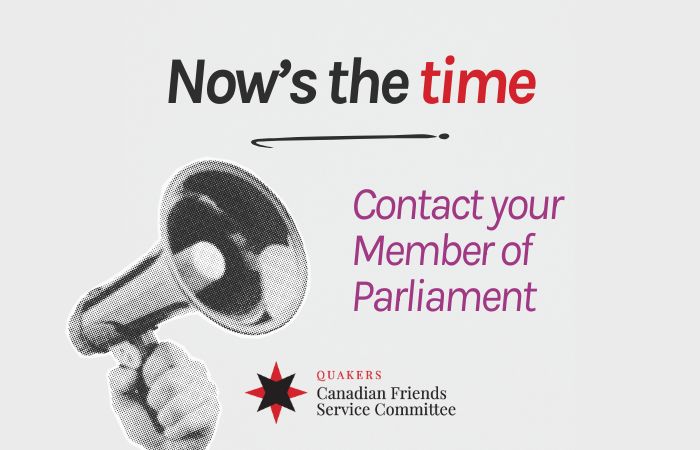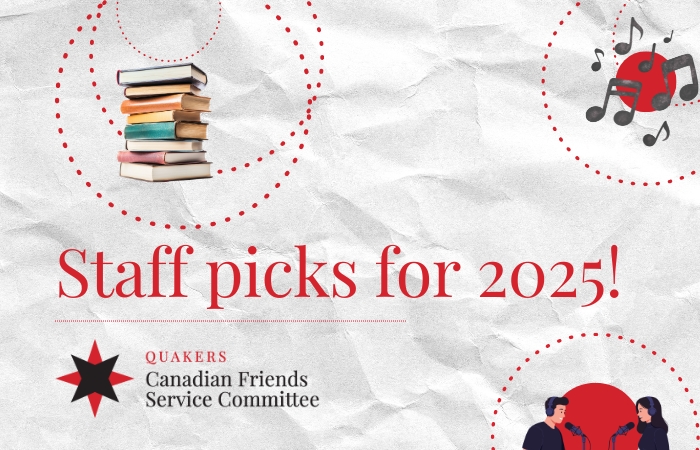
CFSC stands with all Wet’suwet’en people
January 18, 2019
CBC’s The Sunday Edition covers our research on sentencing of parents
April 5, 2019Federal, provincial and territorial interpretation and implementation of free, prior and informed consent must be aligned with Canada’s human rights obligations
In December, in two separate letters issued under their Early-Warning Measures and Urgent Action Procedures, the United Nations Committee on the Elimination of Racial Discrimination (CERD) called on Canada to seek independent, expert advice on implementation of the right of free, prior and informed consent (FPIC).
One letter was issued in response to an ongoing First Nations legal challenge to the Site C dam, a hydro-electric megaproject in northeast British Columbia that the Committee has stated should not proceed without FPIC. The other letter concerned the federal government’s support for the Trans Mountain pipeline despite strong opposition from affected First Nations in British Columbia.
The need for a consistent and well-informed approach to FPIC implementation, however, is broader than either of these projects. This is illustrated, for example, by the high-profile police action in early January to dismantle a barricade supporting the right of the Wet’suwet’en hereditary Chiefs to say no to planned pipeline construction on their territory.

The federal government, as well as some provincial and territorial governments, have made important commitments to upholding the rights of Indigenous peoples, including the implementation of the Truth and Reconciliation Commission’s Calls to Action and the UN Declaration on the Rights of Indigenous Peoples. Unfortunately, even with government statements affirming the right of free, prior and informed consent, respect for this right remains, at best, incomplete and uneven.
Our coalition – made up of Indigenous Nations, Indigenous peoples’ organizations, human rights groups and individual human rights advocates who have all been deeply engaged with the UN Declaration would like to draw the attention of policy-makers to the following considerations:
- Free, prior and informed consent is central to the UN Declaration. In addition to those provisions setting out an explicit requirement to obtain free, prior and informed consent, it is clear that the right of Indigenous peoples to make their own decisions about their lives, territories and futures, as repeatedly affirmed throughout the Declaration, can best be realized if federal, provincial and territorial governments are willing to work in collaboration with Indigenous peoples. Governments must listen when Indigenous peoples decide according to their own laws, customs and traditions whether a project should proceed, be modified or be rejected. Politicians cannot claim to uphold the UN Declaration if their governments do not respect FPIC.
- The importance of free, prior and informed consent is underlined by the fact that the right is so well established in international law. In addition to the UN Declaration, FPIC has been part of the rulings and recommendations of UN and regional Treaty bodies, special rapporteurs and other experts for more than 20 years. It is not a new concept nor is it on the fringes of the progressive development of international human rights law. These human rights bodies have all recognized that FPIC is essential to protect a wide range of Indigenous peoples’ fundamental rights, including the right to culture, the right to food and the right to health.
- FPIC is already part of Canadian law. Treaty-making is only possible with the free, prior and informed consent of Indigenous peoples. In the Delgamuukw and Haida Nation cases, the Supreme Court of Canada explicitly stated that the spectrum of obligations often referred to as “the duty to consult” can include a responsibility to obtain consent on “very serious issues”. And in the Tsilhqot’in case, the Supreme Court not only affirmed that consent is an essential part of land title, the Chief Justice warned government and corporations that proceeding without consent, even where title has not yet been established, could backfire on them.
- Governments cannot pick and choose when to respect FPIC based on political convenience. The UN Declaration states that any limitations on rights, including FPIC, must be “determined by law and in accordance with international human rights obligations,” “non-discriminatory” and “strictly necessary solely for the purpose of securing due recognition and respect for the rights and freedoms of others and for meeting the just and most compelling requirements of a democratic society” (art. 46(2) of the UN Declaration).
- Depending on the project, FPIC may often require long-term, meaningful engagement with several Indigenous Nations. Projects involving multiple jurisdictions are always complex: this is also the case for projects involving various non-Indigenous governments. Critically, however, Indigenous Nations must each have the opportunity to make their own decisions and to speak for themselves. When federal, provincial and territorial governments point to agreements with one Indigenous Nation as an excuse for ignoring the opposition of another, they are doing a grave disservice to their obligation to protect the human rights of all without discrimination. They are also perpetuating old practices of ‘divide and conquer’ that have no place in the policies of governments committed to reconciliation.
- Indigenous peoples have the right to make their own decisions, and to engage with other governments and processes through the systems of governance and decision-making that they have freely chosen for themselves. Such essential dimensions of self-determination are clearly affirmed in the UN Declaration (see, e.g., articles 3, 5, 18 and 19). Federal, provincial and territorial governments cannot ignore the decisions made by Indigenous peoples. Neither can they tell Indigenous peoples how these decisions should be made.
- Agreements entered into under duress do not constitute consent. When governments and corporations refuse to listen when Indigenous peoples say no, these Nations are faced with the difficult choice of continuing to oppose, including taking on the expense, risk and burden of a legal challenge, or trying to negotiate some benefit from a project about which they may have serious concerns. In these circumstances, governments and corporations are clearly exploiting the unequal and unfair power relationships that characterize colonial dominance and the impoverishment that is often the tragic result. Such an approach does not foster reconciliation. Furthermore, it often fails to provide government and industry the certainty that they seek in the first place.
- Disputes over the interpretation and application of FPIC need to be resolved fairly and in a manner consistent with the underlying purpose of human rights protection, rather than through arbitrary and unilateral decisions of the federal, provincial and territorial governments. The UN Declaration calls for dispute resolution mechanisms that are fair, independent, open and transparent and which give due recognition to “Indigenous peoples’ laws, traditions, customs and land tenure systems” (article 27). Canada and other States have an obligation to recognize Indigenous lands, territories and resources, including those that “were traditionally owned or otherwise occupied or used”.
- The UN CERD recommendation specifically urges Canada to engage with the UN Expert Mechanism on the Rights of Indigenous Peoples (EMRIP). EMRIP has recently completed a study on FPIC. It is only the latest in a number of UN bodies and mechanisms, including the UN Permanent Forum on Indigenous Issues and the UN Special Rapporteur on Indigenous Peoples, to offer detailed, expert commentary on the interpretation of FPIC. It’s crucial that federal, provincial, and territorial governments engage experts like EMRIP, both to obtain credible and unbiased advice and to ensure that Canada does not develop interpretations of FPIC that are isolated from or at odds with the ongoing progressive development of international law.
In conclusion, our organizations do not see FPIC as a barrier to development. Rather, it is a crucial safeguard in international human rights law against non-Indigenous governments imposing unjust and unwarranted decisions on Indigenous peoples.
The UN General Assembly has repeatedly reaffirmed by consensus Transforming Our World: The 2030 Agenda for Sustainable Development. An integral element of “sustainable development” is to “protect human rights”. Further, “no one must be left behind”, including Indigenous peoples. This is the ongoing commitment of the international community, including Canada. Effective, consistent and non-discriminatory application of FPIC is essential to that vision of sustainable development that benefits everyone.
The Coalition for the Human Rights of Indigenous Peoples (http://declarationcoalition.ca)
This Open Letter was endorsed by the following Nations, organizations and individuals:
Amnesty International Canada
Assembly of First Nations
BC Assembly of First Nations
Canadian Friends Service Committee (Quakers)
Grand Council of the Crees (Eeyou Istchee)
First Nations Summit
Indigenous World Association
KAIROS: Canadian Ecumenical Justice Initiatives
Quebec Native Women Inc
Union of BC Indian Chiefs
Ellen Gabriel
Sheryl Lightfoot, Canada Research Chair of Global Indigenous Rights and Politics, UBC
Wendy Moss
Learn more about the UN Declaration on the Rights of Indigenous Peoples.




